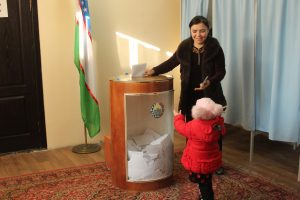Uzbekistan’s next parliamentary election will take place on October 27, the countries’ Central Election Commission announced last week.
Uzbeks will cast ballots for the 150-member Legislative Chamber – the lower house of the Oliy Majlis – well as elect deputies to the 12 regional councils, plus the Tashkent city council and 208 district councils. Voters in Karakalpakstan will elect 65 members to the Supreme Council of the Autonomous Republic of Karakalpakstan.
Uzbekistan’s last parliamentary election took place in late December 2019.
In February 2021, Uzbek President Shavkat Mirziyoyev signed into law a package of reforms that, among other things, moved election day from December to October.
Subsequent reforms, signed into law in December 2023, introduced a mixed electoral system. Previously, Uzbekistan’s elections followed a majority voting system in which the candidate with a plurality of the votes cast would be declared the winner. Under the new system, 75 seats in the Legislative Chamber will be elected in single-mandate districts on a majority basis, while the other 75 will be allocated on a proportional basis by party.
A Senate spokesperson told Interfax in December 2023 that the new arrangement “will help further expand political parties’ role in the parliament’s and local legislature activities…”
Uzbekistan currently has five officially registered parties, but little competition or debate among them.
As a pensioner in Tashkent told me back in December 2019, on the day of the parliamentary elections the authorities had branded with the tagline “New Uzbekistan-New Elections,” “We have five parties, but in fact it’s like one party divided into five pieces.”
In the current parliament, elected in 2019, the Liberal Democratic Party (UzLiDeP) holds 53 seats in the Legislative Chamber – it is considered the president’s party as it was founded by Islam Karimov in 2003. The National Revival Democratic Party or Milliy Tiklanish holds 36 seats; the Justice Social Democratic Party or Adolat holds 24 seats; the People’s Democratic Party holds 22; and the Ecological Party occupies 15 seats.
In the last election, some Uzbek officials cited the Ecological Party as a “new” party – a distinction without difference given the fact that the movement (now recast as a “green” political party) was allotted 15 seats automatically in the 2014 parliamentary election.
It has remained difficult for alternative political parties to achieve the official registration necessary to contest elections.
A case in point: Khidirnazar Allaqulov, a former university rector and dissident, first attempted to register his Haqiqat va Taraqqiyot (Truth and Development) Social Democratic Party in April and May 2021; both times the party was rejected, with the Ministry of Justice denying that they had accumulated the necessary signatures. After the second rejection, the Ministry of Justice issued a press release in which it reminded the party that it must “cease its activities,” citing the Uzbek law on political parties as permitting organizing committees to operate for only three months.
These rejections were accompanied by a pressure campaign. A mob of people accosted Allaqulov at his apartment building in early April 2021. The crowd later filed a lawsuit against Allaqulov and he was fined on libel charges. A student who had been gathering signatures for the party in Namangan was called into a public meeting in the gym of a local school and berated by a crowd of his neighbors, mostly older women.
With just three months to go, the likelihood of any new political parties making an appearance seems slim.
Meanwhile, as Uzbek political scientist Farhod Tolipov told Gazeta.uz in 2023, when the aim to switch to a mixed voting system was announced, “In conditions where there is no rivalry, it does not matter under what system deputies are elected, if they are all members of the same loyal parties.”
There is, of course, an opportunity here for Uzbekistan’s political parties to truly distinguish themselves before the electorate. Whether that happens or not, time will tell.

































